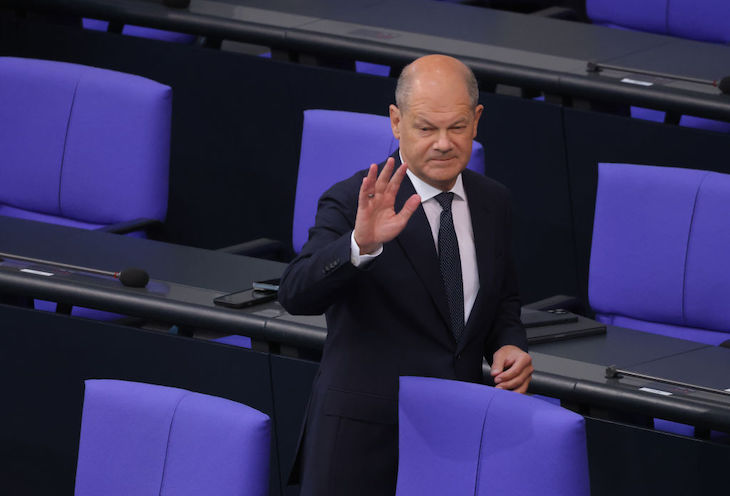The mood in Olaf Scholz’s SPD party headquarters in Berlin is despondent this morning. The German Chancellor’s party won just 13.9 per cent in the European elections – placing them third in the country and a full two percentage points behind the far-right AfD party.
The SPD hasn’t done this badly in a national vote since 1949 – and the result comes less than 18 months until Germany holds its federal election. SPD Leader Lars Klingbeil called it a ‘bitter defeat’. ‘There is no way to sugarcoat it,’ he said. ‘I think it is crystal clear that things have to change.’
The SPD hasn’t done this badly in a national vote since 1949
At the AfD’s Berlin election night party, on the other hand, the mood was one of jubilation. The party did even better than the polls had predicted, making it the second-strongest party in the country. Despite several scandals plaguing its two lead candidates, in the former East German states the AfD did even better. There it took the largest vote share of any party – certain to give it a boost, both in morale and numbers, at the upcoming state elections in Thuringia, Brandenburg and Saxony in September. The party’s co-leader Tino Chrupalla called the win ‘historic’.
The party to score the largest vote share in Germany in these elections was the right-wing CDU/CSU – currently the largest opposition party in Berlin. They took home 30 per cent of the vote, one per cent higher than predicted. The right-wing party attracted many former coalition party voters, according to data by the pollsters Infratest dimap, with the largest switching from the SPD. The results have emboldened the party: its general secretary Carsten Linemann said Scholz should ‘clear the way’ for a federal election, while the leader of the CSU predicted Scholz would last no more than a year.
The SPD’s dismal performance this weekend was partly caused by many former supporters simply not bothering to vote. Crucially, they also appear to be losing the younger vote: 19 per cent of Germans aged 25-34 voted for the CSU/CUD; 18 per cent in the same age bracket voted for the AfD.
Amongst even younger voters, the figures are starker still. This was the first European election in which German teenagers aged 16 and 17 were allowed to vote. Both the CSU/CDU and AfD won 17 per cent of votes from this age bracket. Germany’s youth is leaning to the right, and it appears Scholz’s party has little idea of how to stop this from happening.
Scholz may take some consolation from the fact that his two traffic light coalition partners, the Greens and the FDP did even worse than his own party. The FDP won just 5.2 per cent of the vote, while the Greens emerged the biggest losers of all. The party took home just 11.9 per cent, losing one in three of their voters from the last EU parliament election in 2019.
The election’s underdog party was the left-wing BSW, set up by Sahra Wagenknecht, a rebellious politician formerly of the Left party. Standing in its first ever election, the BSW won 6.2 per cent, hoovering up votes from Wagenknecht’s former party, which emerged with a paltry 2.7 per cent.
This weekend’s results suggest that, after just over two tumultuous years in power, Germans have had enough of Scholz and his traffic light coalition. Scholz was central to his party’s campaign, appearing on the campaign trail with the party’s lead candidate Katarina Barley. The party had posters printed that were emblazoned with the slogan ‘secure peace’, trying to tap into voters’ concern over the support Germany was giving to Ukraine and angst over a future war between Russia and Nato. Yet with a week to go before polling day, Scholz blew apart any image there was of him as a ‘peace Chancellor’ by saying Ukraine could strike targets inside Russia with German-made weapons.
The ill-fitting traffic light coalition will only become more fractious
As Germany draws closer to its federal elections, the ill-fitting traffic light coalition will only become more fractious. Having spent much of the past two years squabbling over a variety of domestic and foreign issues, the FDP and Greens will likely do all they can to differentiate themselves and distance themselves as much as possible from Scholz’s sinking SPD ship.
The AfD, meanwhile, will be making hay while the sun shines. The party is now hoping to rebuild bridges with the ID group in Brussels, after the French right-wing politician Marine Le Pen kicked them out during the election campaign following unsavoury remarks about the SS made by the party’s lead candidate Maximilian Krah. They may well look to replace the party’s Brussels leader: one contender is the party’s number three list candidate Rene Aust. Asked to comment on the party’s future in Brussels, Aust said there had been ‘a short break in the relationship with Mrs Le Pen.’ That ‘break’ is unlikely to remain a long one.
Watch more analysis from Lisa Haseldine and Historian Katja Hoyer on Spectator TV:








Comments